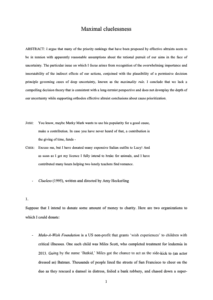Maximal cluelessness
Andreas Mogensen (Global Priorities Institute, Oxford University)
GPI Working Paper No. 2-2019, published in The Philosophical Quarterly
I argue that many of the priority rankings that have been proposed by effective altruists seem to be in tension with apparently reasonable assumptions about the rational pursuit of our aims in the face of uncertainty. The particular issue on which I focus arises from recognition of the overwhelming importance and inscrutability of the indirect effects of our actions, conjoined with the plausibility of a permissive decision principle governing cases of deep uncertainty, known as the maximality rule. I conclude that we lack a compelling decision theory that is consistent with a long-termist perspective and does not downplay the depth of our uncertainty while supporting orthodox effective altruist conclusions about cause prioritization.
Other working papers
The cross-sectional implications of the social discount rate – Maya Eden (Brandeis University)
How should policy discount future returns? The standard approach to this normative question is to ask how much society should care about future generations relative to people alive today. This paper establishes an alternative approach, based on the social desirability of redistributing from the current old to the current young. …
Economic growth under transformative AI – Philip Trammell (Global Priorities Institute, Oxford University) and Anton Korinek (University of Virginia)
Industrialized countries have long seen relatively stable growth in output per capita and a stable labor share. AI may be transformative, in the sense that it may break one or both of these stylized facts. This review outlines the ways this may happen by placing several strands of the literature on AI and growth within a common framework. We first evaluate models in which AI increases output production, for example via increases in capital’s substitutability for labor…
Should longtermists recommend hastening extinction rather than delaying it? – Richard Pettigrew (University of Bristol)
Longtermism is the view that the most urgent global priorities, and those to which we should devote the largest portion of our current resources, are those that focus on ensuring a long future for humanity, and perhaps sentient or intelligent life more generally, and improving the quality of those lives in that long future. The central argument for this conclusion is that, given a fixed amount of are source that we are able to devote to global priorities, the longtermist’s favoured interventions have…

